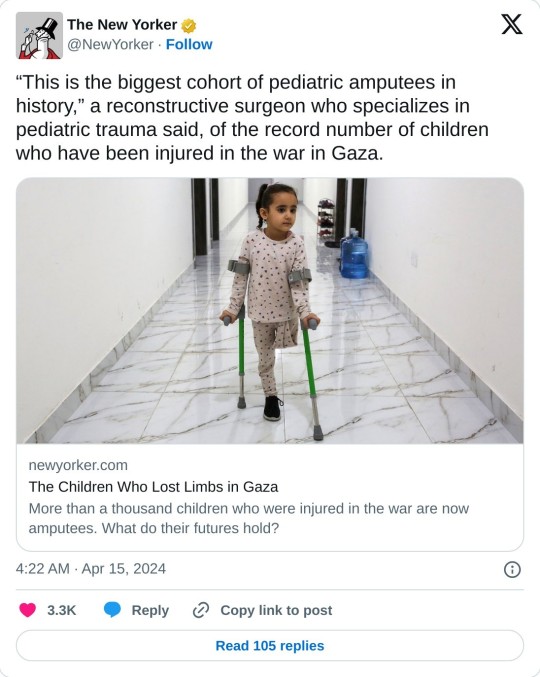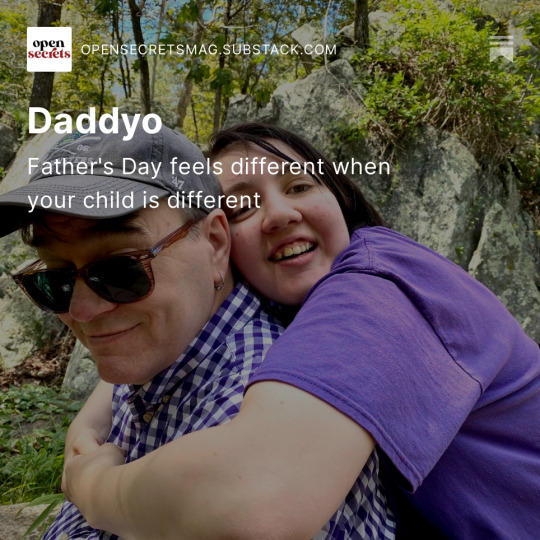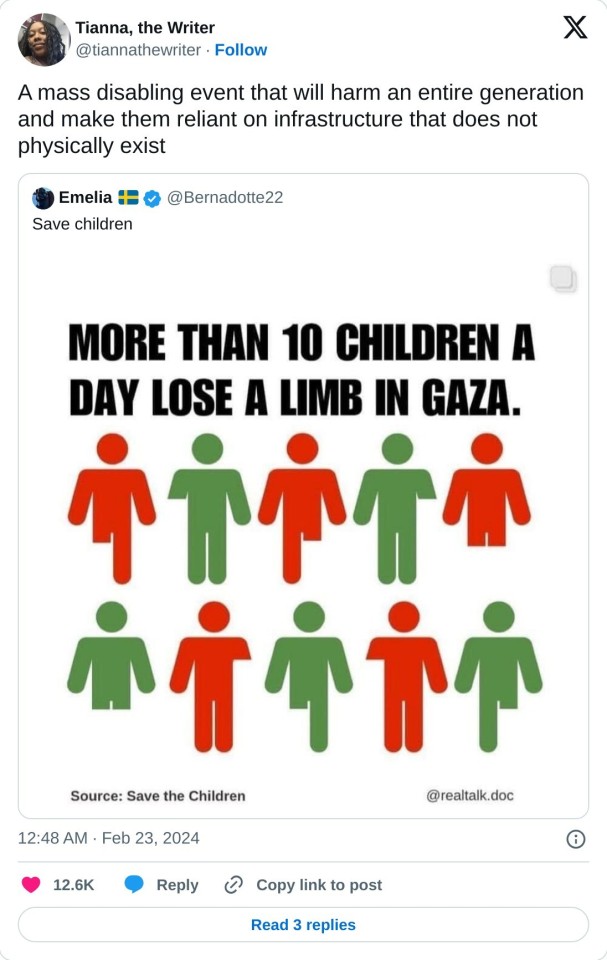#children with disabilities
Text

unicef estimates that a thousand children in Gaza have become amputees since the conflict began in October. “This is the biggest cohort of pediatric amputees in history,” Ghassan Abu-Sittah, a London-based plastic-and-reconstructive surgeon who specializes in pediatric trauma, told me recently. I met him in the waiting room of his plastic-surgery clinic on London’s Harley Street, and we walked to a nearby pub for a glass of water. Abu-Sittah, a fifty-four-year-old British Palestinian with an angular face and tender, deep-set eyes, has treated child survivors of war for the past thirty years in Iraq, Yemen, Syria, and elsewhere.
Abu-Sittah is the author of “The War Injured Child,” the first medical textbook on the subject, which was published last May. In October and November, he spent forty-three days in Gaza, conducting emergency surgeries with Doctors Without Borders. He shuttled between two hospitals: Al-Shifa and Al-Ahli, which is also known as the Baptist hospital. The casualty rate was so high that, during some intense periods, he didn’t leave the operating room for three days. “It felt like a scene from an American Civil War movie,” he said.
In Gaza, Abu-Sittah was performing as many as six amputations a day. “Sometimes you have no other medical option,” he explained. “The Israelis had surrounded the blood bank, so we couldn’t do transfusions. If a limb was bleeding profusely, we had to amputate.” The dearth of basic medical supplies, owing to blockades, also contributed to the number of amputations. Without the ability to irrigate a wound immediately in an operating room, infection and gangrene often set in. “Every war wound is considered dirty,” Karin Huster, a nurse who leads medical teams in Gaza for Doctors Without Borders, told me. “It means that many get a ticket to the operating room.”
To mark the gravity of these procedures, and to mourn, Abu-Sittah and other medical staff placed the severed limbs of children in small cardboard boxes. They labelled the boxes with masking tape, on which they wrote a name and body part, and buried them. At the pub, he showed me a photograph he’d taken of one such box, which read, “Salahadin, Foot.” Some wounded children were too young to know their own names, he added, telling the story of an amputee who’d been pulled from rubble as the sole survivor of an attack.
#yemen#jerusalem#tel aviv#current events#palestine#free palestine#gaza#free gaza#news on gaza#palestine news#news update#war news#war on gaza#children of gaza#gaza genocide#disability rights#disability justice#children with disabilities#war crimes#genocide#i've posted this before but i'm posting again because it's worth remembering
862 notes
·
View notes
Text
New research details how children with disabilities are ignored and devalued by doctors and other health care providers, potentially leading to substandard care.
In interviews, parents of kids with complex medical needs reported that their children were treated differently and provided limited accommodations when seeking medical treatment. Parents recalled situations where they were told that care could not be provided because of a child’s disability, instances where providers talked to them and not their child and circumstances where they were essentially told not to bother with treatment.
The experiences are outlined in a study published this week in the journal Pediatrics that’s based on interviews with 30 family caregivers of children ages 18 months to 18 years with medically complex conditions across 15 states. Most of the children involved in the study required some type of health care more than 20 times per year.
“Our goal was to validate families’ experiences and bring awareness to the issue,” said Dr. Stefanie Ames, a critical care physician at University of Utah Health who led the study. “Recognizing the problem is the first step.”
One caregiver told the researchers that her child was given inadequate pain relievers during a procedure and another said a doctor advised against treating her daughter’s cancer even though the treatment was likely to be successful.
“They didn’t treat her like she was really alive,” one caregiver said. “They absolutely looked at her as if she was a vegetable and completely nonresponsive, which is not the case.”
Another study participant recalled the response she got from a physician about reading to her daughter.
“(The doctor said), ‘Well, you can (read) if it makes you feel better, but she’s not really learning, and she’s not really responding like other kids. She responds like a dog.’ That’s literally what he said. Those were his words, and you think this is the clinic for people with special health care needs.”
Overall, the family caregivers interviewed said that they believed the main reasons for the discrimination their children experienced were rooted in limited knowledge about caring for kids with complex medical needs, a disinterest in providing care to children seen as unworthy and negative assumptions about a child’s disability and quality of life.
In an commentary published in Pediatrics alongside the study, Dr. Stacey Cook, Dr. Sangeeta Mauskar and Dr. Jay G. Berry, who all specialize in caring for children with medical complexity at Boston Children’s Hospital, indicated that there’s good reason to believe that the trends identified in the study are emblematic of what’s happening more broadly.
“We believe that the disheartening findings presented in Ames et al are true and generalizable. Throughout our training and careers across institutions in all US geographic regions, we have repeatedly heard derogatory language used when pediatric providers present and discuss (children with medical complexity),” they wrote, citing the example of a child with medical complexity being called “a trainwreck kid.”
Those behind the study said that the findings point to a need for better training about disabilities for medical providers.
“I believe that all health care providers choose this line of work because of the common goal of helping those in need,” said Dr. Nancy Murphy of the University of Utah. “Yet when providers lack the knowledge, experience or resources to render care, we tend to shy away from situations. This tends to happen without our awareness, and this research brings this issue into clear view.”
87 notes
·
View notes
Text
I think people with disabilities who have disabilities that may impair their ability to take care of their children deserve to have better resources or a resource to help them with childcare, a live in individual or someone to come help them daily with parenthood, transportation for their children, grants and funding like child support, etc.
I know of the debate about if people with disabilities should be encouraged not to have children or in some cases have their children taken away from them because they have a hard time taking care of them or can’t fully or easily do everything an able bodied parent may be able to do for their children like travel to school or extracurricular events, come to their child’s aid quickly at sudden moments or in the middle of the night with having to transfer themselves into wheelchairs, etc. etc.
This also goes for people with disabilities who ALSO have children with disabilities who have special needs or need extra support as well. There needs to be more accommodations for people with disabilities who are parents!!
There are people with disabilities who have children of their own who aren’t married or don’t have the support systems they have every right to so that they can show up for their children or be a the best parent they can possibly be.
#parents with disabilities#childcare#children with disabilities#support for people with disabilities#disability awareness#parental support
8 notes
·
View notes
Text
Fuckin Around :p
If one million people sent me $1 id be a millionaire.....
i mean feel free to lmao
$ashleydonna26
#life#money#cashapp#onemillionpeople#love me#bisexaul#sexy nerd#love#jokesmaybe#curious#singlemother#children with disabilities
9 notes
·
View notes
Photo

Ahead of Father’s Day, the latest Open Secrets essay is “Daddyo” by Robert Hudson, about being a father to Schuyler. Here’s a snippet:
If I allowed myself to sink without a fight, I suppose Father’s Day could be a reminder of my perceived helplessness, of all the times I got it wrong, of the moments in which I felt that I let Schuyler down. But the thing is, that’s never been the case. I may feel those things, and frequently do. But on Father’s Day, I give the day to Schuyler, and I embrace the version of me that she is so keen to celebrate. She doesn’t focus on my uncertainty or my mistakes, although I know she is probably all too aware of them both.
Open Secrets is a reader-supported publication for memorable, revealing personal essays. To receive new posts, support our work, and help us continue to publish, consider becoming a free or paid subscriber.
4 notes
·
View notes
Text




MJ'S CONTRIBUTION TO THE PERTH TELETHON
____________________________
It was around October, 1985.
Michael flew to Australia to attend The Perth Telethon, hosted by Molly Meldrum. Perth Telethon is a program that raises funds for hospitals and charities focused on health and protection of children. Two major beneficiaries of the telethon are The Princess Margaret Hospital for Children, and the Telethon Institute for Children. It wasn't only Michael's appearance to skyrocket donations, but he also donated two fedoras and a pair of rhinestone socks to the foundation to be auctioned off and funds donated to the cause. After his appearance on the Telethon, which raided over 2.8 million Australian dollars, Michael visited the "Princess Margaret Children's Hospital" where, once again The king of Pop spent hours meeting terminally ill patients, signing autographs and giving out gifts. Michael also visited "Cohuna Wildlife Sanctuary" in Perth before flying back to the U.S.
Two patients of the Princess Margaret Children's Hospital, Helen Francis and Luke Smith, were lucky enough to meet Michael on the set of the Perth Telethon. There are others background stories around 1985 that involves Michael's humanitarian side, so keep reading if you wanna know more about them.
The first story was around March, 1985, Michael visits a young girl who remains paralysed after a car accident in Miami, Florida. Later he will send her a recording of the Victory Tour concerts and a jacket.
The second story is around March 29, 1985, on the day after he unveiled his max figure at Madame Tussauds in London. Michael privately visited the Royal London Hospital for the second time in two years. Michael spent around three hours giving out gifts, signing autographs and lifting the spirit of terminally ill children. He also made an undisclosed monetary donation. The final story was around July of the same year when Michael was filming his newest 3D film "Captain EO". A part of the stage fell on Michael's already sprained wrist, requiring him to go to the hospital. After being assessed by his doctor, he wandered the wards, meeting & greeting patients, still in his Captain EO costume.
______________________________
(Follow @imthebadmichael on Instagram to see more exclusive contents)
To your support during the past few months. Especially to those who shared this important stories..
THANK YOU🤍
#michaeljackson#kingofpop#mj#michaeljacksonedits#kingofmusic#mjinnocent#human being#humanitarian#telethon#children#children with disabilities#charity#trending#random facts
14 notes
·
View notes
Text
Cartoons / Anime Classes for Children/Youth. $50. per hour of instruction, for up to 5 students. Can be held in your home, local library or facility of your choice. Ashley Nitkin:
(647) 403-9244.

References available. 20+ years of experience working with children.
#children#parenting#art activity#animation#trans youth#youth#tumblr draw#drawing#anime fanart#anime art#cute animals#family#children with disabilities#children's illustration#children's hospital#daycare#developmentally disabled#down syndrome
1 note
·
View note
Text
In this article, we will explore key considerations for parents embarking on the path of long-term care planning for their beloved child.
0 notes
Text

The Power of Imperfect Parents by Lynda Drake
Feeling lost guiding your child through mental health struggles? You're not alone. "The Power of Imperfect Parents" by Lynda Drake offers life coaching designed for parents of kids with mental health issues. This book is a warm hug for parents facing difficult conversations and the complexities of raising a child with special needs.
Embrace imperfection and navigate with love. Grab a copy at www.lyndadrake.com.
#Lynda Drake#The Power of Imperfect Parents#ReadersMagnet#Parenting Books#Special Education#Parenting Books on Children with Disabilities#Children with Disabilities
0 notes
Text
youtube
#children who chase lost voices#children with disabilities#children ruin everything#children rights#Youtube
0 notes
Text
Educating Special Needs Students
Teaching is always a daunting task, but educating special needs students is something that needs a lot of effort. One of the most critical steps in aiding students with disabilities is early detection and intervention. Only well-qualified teachers and specialized educators can aid those students. However, a special education teacher works with children with mental retardation and teaches them life skills and competency.
Many special education teachers adapt the general education curriculum to meet the needs of their students. They conduct well-organized classrooms for disabled students, stating instructions for specific learning disabilities and difficulties. Additionally, special education classrooms provide a unique service to mentally or physically challenged children. The ideal education class focuses on providing individualized attention to the children who most need it.
Apart from that, education is important for every child. It allows them to gain confidence and face the difficulties of life. Education plays a vital role in the lives of special needs students because it helps them in their personal growth and development. It allows them to reach their full potential with their unique needs. In this blog post, we will discuss some tips and ideas for educating students with special needs.
Who are special needs children?
Children with special needs require exceptional care and extra help. A child who requires special care may have intellectual disabilities, learning disabilities, emotional difficulties, or physical disabilities. Guardians or parents of these children usually receive some sort of tax credit or deduction to address the additional costs of raising a special-needs child. The following is a list of some of the learning-disabled students that have:
high frustration level and low tolerance level
poor auditory memory—both long-term and short-term
weak or poor self-esteem
there is a lot of confusion.
some difficulty in working in groups
inflexibility of thoughts
poor concept of time
poor handwriting skills, etc.
To get the daily booster, you can visit: Daily Booster Article| study24hr.com
The Purpose of Educating Special Needs Students
The main purpose of educating students with special needs is to mitigate the challenges that keep learners with learning disabilities from understanding the curriculum. Three types of interventions genuinely work for disabled children.
Remedial Interventions
Remedial interventions aim at eliminating the effects of a disability by equipping learners with the skills they need to function on their own. For example, teaching learners with ADHD (Attention Deficit Hyperactivity Disorder) to thrive and enter into activities helps improve their level of task initiation.
Preventive Interventions
The main target of this intervention is to either reduce a condition that has been identified or stop something from happening. For example, preventing psychotic episodes in children with bipolar disorder by managing a particular routine.
Compensatory Interventions
The goal is to provide students with special needs with a special device that non-disabled kids do not need. For example, giving students with autism phonetic spelling software that helps them automatically convert the word they intended to write.
Teaching tips for learners with special needs
There are several tips that teachers can use to promote learning. Educators can use the following strategies to improve the understanding level of disabled students, depending on the disability of the students:
1. Create a support network
A support network refers to people in your child’s life who can offer them emotional and practical support. All children need a network of people they can turn to, for support beyond just their parents. As a special education instructor, you need to work with your student’s general education experts as well as their parents. The more you communicate with each other, the more things become easier. Moreover, it helps students reach their potential.
2. Give students opportunities for success
Educators should encourage students to work hard and improve themselves by providing opportunities for small achievements and then celebrating those achievements. They can help learners by setting measurable, clear, and challenging goals. Besides, allow children to use a word processor with a spell checker and offer them advance notice of written assignments.
Learners benefit from “study24hr.com” because it saves them time and money. It enables students to save time and money and allows learners to access the portal for whatever information they require. The platform offers mock tests in PDF formats and daily boosters for enhancing students’ academic performance.
3. Keep things simple
When it comes to educating special-needs children, it is crucial to break down tasks into manageable and small steps. Educators should keep assignments and project work short and simple. The more complicated they make things, the more likely their students are to become frustrated and confused.
4. Keep your classroom well-organized.
Organizing a classroom for students with special needs is one of the most challenging tasks of teaching. Teachers must use strategies to teach students in a well-organized way and according to the child’s capabilities. Individualized instruction and specific types of education are required to make them comfortable while learning. It is important to understand their behavior and supervise them accordingly.
Teachers should conduct effective lessons
Educators should conduct effective lessons for students with special needs and review their problems before jumping into the next lesson. Show students how to highlight the important facts and factors that will help them at the time of revision. Here are some effective ideas that help teachers conduct effective class sessions.
Don’t rush your students; rather, ask them to probe questions and give them enough time to solve an equation.
Divide assignments into small, manageable tasks.
Discuss their thoughts and share ideas as a collective.
Provide oral directions for special-needs students.
Avoid high-pressure and limited-timing tests.
Question each student to gauge their mastery of the chapter’s content.
Provide these children with extra explanations or request a classmate to serve as an instructor for the lesson.
Conclusion
While each student and their disability are unique, there are several ways that children can be helped. If a student gets special accommodations, it will improve their behavior and lifestyle. With special education, disabled students can get the necessary resources in effective and functional ways that promote their achievement and participation levels. Moreover, the quality of their lives can be improved as education provides development opportunities and a better learning process. Thus, educating special needs children is an integral part of securing their future.
#special needs#disability#children with disabilities#students#parents#teaching#educators#lesson#success#mental retardation#learning#study24hr#blog#bipolar disorder#tumblr#mental illness#mental problems
0 notes
Text

10 children a day lose their limbs in Gaza. All hospitals in Gaza are basically barely functioning and the amputations are done in unsanitary conditions and without anesthesia
#yemen#jerusalem#tel aviv#current events#palestine#free palestine#gaza#free gaza#news on gaza#palestine news#news update#war news#war on gaza#children of gaza#disability#disabilities#disability rights#disability justice#genocide#gaza genocide
41K notes
·
View notes
Text
For every child, immunization.
When The State of the World’s Children first went into print in 1980, 10 per cent of the children born that year died from preventable causes. By 2018, that number had declined to just 3 per cent. Thanks to milestones such as the adoption of the Convention on the Rights of the Child in 1989, children are now on global and national policy agendas in ways that were not possible. Each State of the World's Children (SOWC) examines a key issue affecting children. These have ranged from children with disabilities, conflict and war, child labour, urbanization, early childhood development, and much more, making it the most comprehensive analysis of global trends that impact children. The topics and recommendations provided in the SOWC also guide UNICEF’s priorities, helping us design, calibrate and implement country programmes effectively and with an eye on the needs of the world's children.

Read the full report of the State of the World's Children's 2023 entitled "For every child, immunization".
#unicef#issue affecting children#publication#State of the world's children#children with disabilities#conflict and war#child labour#urbanization#early childhood development
0 notes
Text
Hey everyone ! Please consider signing. I am trying to advocate for student loan forgiveness for caretakers of children with disabilities!! Thank you all!
#politics#autismmom#socialwork#adhdparenting#disability#disabilityawareness#disabled#student loans#student loan forgiveness#petition#children with disabilities#government
1 note
·
View note
Text

Discover the inspiring efforts of NGOs working tirelessly for disabled people in India! Explore how these organizations are changing lives and organizing for a more inclusive society.
0 notes
Text
Financial constraints and the unknowns of caring for the child make it difficult to work steadily, much less plan for retiring one day.
0 notes